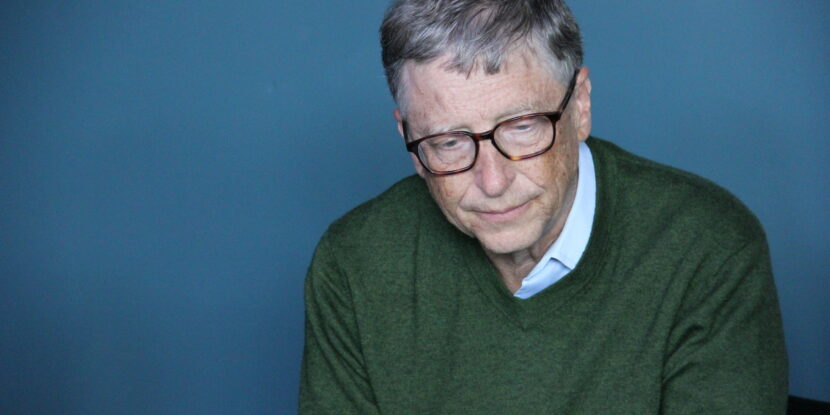Microsoft billionaire Bill Gates, who notoriously praised the Chinese government’s handling of coronavirus, has collaborated with a Chinese Communist Party-linked nuclear firm tied to the nation’s military, The National Pulse can reveal.
The Microsoft billionaire chairs a nuclear power initiative working alongside a Chinese energy company deemed a military asset by the U.S. government. Gates has also extolled China’s economic exploitation of Africa as “valuable” and “beneficial.”
The tech-entrepreneur “philanthropist” came under fire for insisting the Chinese Communist Party (CCP) “did a lot of things right” with its coronavirus response, but the undeserved and factually inaccurate praise was just the tip of the iceberg concerning Gate’s consorting with China.
As the Chinese Embassy to the U.S. revealingly phrased it back in 2010: “Bill Gates bats for China.”
CHINA NATIONAL NUCLEAR CORPORATION.
But Gates’s ties to the CCP are not limited to merely rhetoric: Terrapower, a nuclear energy research company founded and chaired by him works with China National Nuclear Corporation (CNNC), a wholly government-funded and administered company.
What’s more, the state-owned enterprise is involved with “the development of China’s nuclear energy programs, both civilian and military.”
The U.S. Department of Defense had quietly identified CNNC as a Chinese military collaborator since 1999, with the names only first being made public in June of this year:

The State Department has also highlighted the risk of engaging with state-owned nuclear enterprises like CNNC which function “as a strategic tool with which to augment China’s “comprehensive national power” – both through development in the civilian sector and in support of a military buildup.”
Amongst further explanation of why “it would be little short of madness for any potential foreign partner to engage uncritically with the Chinese nuclear industry,” Assistant Secretary of the Bureau of International Security and Nonproliferation Dr. Christopher Ashley Ford singled out CNNC four times.
CNNC “wants as much Western technology as quickly as they can, but they aren’t always willing to work with the actual developers and producers of such technology in the ways they should in order to ensure proper safety and quality control” and has used Western nuclear software to “support Beijing’s efforts of high-technology military modernization.”
While the Terrapower collaboration with CNNC ended over a year into the project, it was not of their own accord. Trump administration policies appear to have ended the plan between Gates and the Chinese Communist Party-controlled firm.
Gates himself attributed the cessation of the joint venture to “recent policy changes here in the U.S.,” suggesting he’d reinstate the project “if we get over these obstacles”:
The Chinese State Council awarded Gates with one of the country’s highest accolades: lifetime membership in the country’s Academy of Engineering for his work on Terrapower.
As the only non-academic foreigner hand-picked by the CCP for the award, Gates’s close ties to the Chinese government are evident by meeting with Chinese President Xi Jinping “on various occasions and discussed further nuclear energy cooperation with Premier Li Keqiang earlier this month.”
EXPLOITATION ENABLER.
Gates has spoken highly of China’s economic exploitation of Africa by means of “debt-trap diplomacy”: a duplicitous process where the CCP strategically grants sizable loans to countries for infrastructure and transportation projects they know they wont’t be able to pay back. Once countries, chiefly in Africa, default, the CCP then requisitions the projects, often amassing additional political and economic power.
The Kenyan government, for example, was forced to relinquish its Port of Mombasa to China as a result of unpaid debt.
Left-wing media, think tanks, and even politicians including Hillary Clinton have compared the practice to “new colonialism,” boosting China’s economy and access to raw materials while Africans see little in return.
Despite this deceit, Gates hailed the prospect as helping to “create a shared future in a fractured world” while speaking with state-run media outlet China Global Television Network (CGTN) at the 2018 Davos Summit.
Beyond praising President Xi Jinping’s speech as “the most important one given at the conference,” Gates euphemistically describes China’s debt-trap diplomacy efforts as “sharing lessons” and “reaching out”:
China’s opening up and sharing its experiences while it continues to develop very rapidly. It’s great that China has grown. It’s now able to share those lessons and reach out, increase its aid budget over time. The commitments that were made to Africa were very impressive. President [Xi] has made the relationship with Africa a top priority.
Gates doubled down, adding “China’s got a lot of expertise where it’s recently fixed the agriculture and the health, and a lot of that expertise could be so valuable to Africa. So there’s mutually beneficial ways that I see a strong commitment.”
He even expressed excitement for his planned attendance of the Forum on China-Africa Cooperation (FOCAC), the principal meeting where financial arrangements between the two countries are secured: “He’s had his FOCAC meetings. There’s one coming up in September that I’m looking forward to attending that.”


